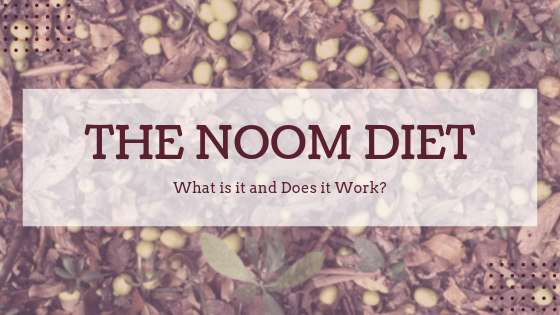If you've heard about something called the Noom Diet, and what to know what it is, if it works, how much it costs, and whether or not it is another fad diet, then you want to read this article.

Not a year goes by without the health and fitness market being inundated by all sorts of fitness crazes, workout trends, and fad diets. 2018 saw the dramatic rise of all things low-carb and keto dominate the landscape, and early into 2019 another fitness craze is dominating the headlines.
It’s known in some circles as “Weight Watchers for Millenials” and offers yet another opportunity to help individuals lose weight and get healthy.
It’s called the Noom Diet, and we’ve got all the details about this social media phenomenon ahead.
So, let’s get started.

What is the Noom Diet Plan?
Noom is a health and wellness app targeted to millennials seeking a healthier life through a mixture of weight loss and the development of better lifestyle habits.
The main difference between Noom and many of the other popular calorie tracking or weight loss apps is that Noom has been developed by behavioral psychologists set on helping individuals get healthy by toppling the mental and emotional barriers that many have towards healthy eating.
How can an app help individuals overcome these obstacles?
Well, Noom shifts the focus away from pure weight loss and extreme food elimination diets (i.e. keto, carnivore, paleo, etc.), and instead has individuals direct their attention to making realistic, sustainable lifestyle changes.

Noom does this in a few different ways:
- Creates a personalized calorie breakdown based on an individual’s responses to a series of questions
- Allows users to log their food intake by searching databases or scanning barcodes (similar to the functions of MyFitnessPal)
- Tracks physical activity (i.e. exercise)
- Keeps a record of your weight, blood pressure, and blood sugar levels
- Offers in-app one-on-one coaching during regular business hours
- Offers encouragement via interactive quizzes and articles
Additionally, unlike many other diet gimmicks over the years, which blame a certain food or entire macronutrient group for why individuals can’t lose weight, Noom consistently drives home the point that losing weight is all about calories. If you burn more calories than you consume on a daily basis, you will lose weight.
It’s as simple as that, but the reason many still struggle to lose weight (in the eyes of the Noom creators) stems from the fact that there are mental and behavioral impediments, which the team hopes to address with its one-on-one coaching service and interactive articles.
What Foods Can I Eat on the Noom Diet?
Unlike many other recent diet trends, Noom does not eliminate certain food groups or entire macronutrient classes. Instead, it seeks to create a healthier, more sustainable approach to eating by encouraging users to eat real, whole foods and make meals and snacks as nutrient-dense as possible.

Similar to Weight Watchers, which uses a points-based system to help users identify healthy eating options, Noom uses a color-coded system where foods are grouped into green, yellow, and red categories. It’s also worth noting that no foods are considered off limits with Noom, even so-called “bad foods” like potato chips. Remember, it’s all about moderation and establishing healthy choices.
Green foods are the least calorie-dense yet offer high amounts of micronutrients. These include such foods as green vegetables, whole grains, and fruits.
Yellow foods are moderate calorie-dense foods that have more calories than green foods per serving but still pack a micronutrient punch. Included in this list are most protein sources (beef, chicken, pork, eggs, etc), cheeses, white bread, white pasta, diet soda, beer, and avocados, to name a few.
Red foods are the most calorie-dense foods that should be eaten in limited quantities or infrequently. Foods included in the red category are fatty cuts of meat, processed foods, and full-fat dairy.
Additionally, much like Weight Watchers, Noom users check in daily with a coach or “Goal Specialist, who is there to offer support and guidance. You can check-in with your Goal Specialist weekly (similar to the weekly weigh-ins for Weight Watchers) or have an ongoing chat with them depending on how much encouragement, guidance, and accountability you need.
Does the Noom Diet Plan Work?
If you read the Noom app description, you’ll see that the creators make some pretty bold claims, including[1]:
“People who use Noom lose an average of 18 pounds in just 16 weeks!”
“78% keep the weight off for over a year.”
“Scientifically-proven psychology approach to “trick” your body into building healthy habits, faster”
So, how can Noom make such high claims when it seems that most diet fads yield only short term results, and over the long-term most dieters end up regaining the pounds they lost plus a few more?
Noom doesn’t solely focus on food. The creators of Noom realize that eating healthy is only a part of the battle to lose weight. There are also numerous other hurdles aside from deciding what is healthy, such as emotional needs, pre-existing dietary and lifestyle habits, fitting in with social norms, finding the time, etc.

Perhaps the biggest upside to Noom is the real-time accountability afforded by the app. Users can interact with other goal setters in the community as well as their coach anytime they need help or a bit of motivation and encouragement.
However, it should be noted that coaches aren’t available 24/7. As ideal as that would be, it’s not always practical for a given coach to be available at a moment’s notice at any hour of the day for the user.
Here, is where a bit of a problem could arise, as it’s during non-business hours when most people have the greatest temptation to resort to their bad dietary habits of old (e.g. binging on cheese fries at midnight after a night out with friends).
In the end, if you are a tech-thirsty millennial who enjoys navigating their way through life via all sorts of apps, Noom offers a viable option to establishing healthy dietary habits. If you’re not, don’t worry, you can still lose weight counting macros and tracking calories the way you always have.
How Much Does Noom Cost?
The developers of the Noom diet have created numerous payment plans depending on how long consumers would like to use the program. For the individuals looking to “test the water” or those that just have a little bit of weight to lose, Noom offers the following three options:
- Monthly plan: $59
- 2-month plan: $99
- 4-month plan: $129 USD
For individuals who have considerably more weight to lose or enjoy having the accountability afforded by the app, Noom also offers 6-, 8-, and 12-month plans:
- 6-month plan: $149 USD (originally $360)
- 8-month plan: $159 USD (originally $480)
- 12-month plan: $199 USD (originally $620)
As you can see, the per-month cost of Noom decreases the longer you commit. But, if you’re not quite ready to fully commit to a subscription-based diet coaching app, Noom allows interested users to test drive the app for 14 days a fee of $1.
Now, it should be noted that Noom employs an auto-recurring billing system. So, for example, if you signed up for a 2-month plan, at the end of your two months, you will automatically be “re-upped” for another two months at the $99 rate.
The Bottom Line on the Noom Diet
At the end of the day, despite a high price tag, restricted “office hours” for coaching, and the use of buzzy catch words like “quick-fix” and “trick your body”, Noom does offer a refreshing take on how to approach weight loss.
Is it a miracle cure?
No, not at all.
For those that enjoy having the accountability and ease of tracking with an app, Noom offers a viable option for weight loss and lifestyle habit makeover. For those that don’t want or need the accountability and can tackle the issue of sustainable, healthy fat loss on their own, Noom is something that can be passed on.









Leave a comment
This site is protected by hCaptcha and the hCaptcha Privacy Policy and Terms of Service apply.